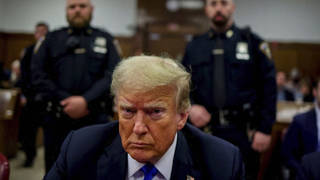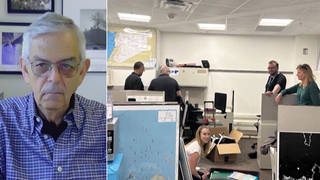
Guests
- Jacqui Maxwella crane operator and a member of the United Auto Workers. She interrupted Donald Trump’s speech at the Detroit Economic Club on Monday.
On Monday, protesters interrupted Donald Trump more than a dozen times during a speech at the Detroit Economic Club, in which Trump laid out his economic policies. During the speech, Trump vowed to slash corporate taxes and end the estate tax. He also said he would reject the Trans-Pacific Partnership and renegotiate trade deals including NAFTA. For more on Donald Trump’s speech and the interruptions, we speak with Jacqui Maxwell, a crane operator and a member of the United Auto Workers. She interrupted Donald Trump’s speech at the Detroit Economic Club on Monday.
Transcript
AMY GOODMAN: This is Democracy Now!, democracynow.org, The War and Peace Report. I’m Amy Goodman. Republican presidential nominee Donald Trump spoke at the prestigious Detroit Economic Club Monday, where he laid out his economic vision. Trump vowed to slash corporate taxes and end the estate tax. He also said he would reject the Trans-Pacific Partnership and renegotiate trade deals including NAFTA, the North American Free Trade Agreement. Trump’s speech was interrupted more than a dozen times by protesters.
DONALD TRUMP: Without security, there can be no prosperity.
PROTESTER: [inaudible]
DONALD TRUMP: Home ownership is at its lowest rate in 51 years.
PROTESTER: [inaudible]
AMY GOODMAN: During Trump’s speech at the Detroit Economic Club, he vowed to push an “America First” economic plan.
DONALD TRUMP: Americanism, not globalism, will be our new credo. Our country will reach amazing new heights, maybe heights never attained before. All we have to do is stop relying on the tired voices of the past. We can fix a rigged system by relying on the people, who—and just remember, this is so important—we are reliant on people that rigged this system in the past. We can’t fix it if we’re going to rely on those people again.
AMY GOODMAN: To talk more about Donald Trump’s speech, we are joined by two guests. Jacqui Maxwell is a crane operator and a member of the United Auto Workers. She interrupted his speech at the Detroit Economic Club Monday. And Matt Taibbi is an award-winning journalist with Rolling Stone magazine. He’s been closely following the Trump campaign, one of his recent pieces headlined “A Republican Workers’ Party?” Matt Taibbi is also the author of several best-selling books, including The Divide: American Injustice in the Age of the Wealth Gap.
Let’s go to Jacqui first, Jacqui Maxwell in Detroit. Why did you interrupt the speech? How did you get in, and what were you shouting?
JACQUI MAXWELL: Good morning. I received a ticket from a friend of a friend. I was asked to participate with Michigan People’s Campaign. My question that I asked of Trump in this speech, when I interrupted his speech, was: How did he feel it was winning for Michigan automotive workers to cut our pay and to threaten to move our jobs elsewhere in the country, where people would work for less pay and we would be begging for our jobs back?
AMY GOODMAN: How does his proposals suggest that that would happen, Jacqui?
JACQUI MAXWELL: Approximately—almost a year ago to the date, actually, to this week, he made those statements that U.S. auto workers, we make too much money, we’re overpaid, that maybe we should move those auto jobs, automotive jobs, in Michigan, where people will be more appreciative of lower wages, they’d work for less, and then the Michigan automotive workers would be begging to have their jobs back.
AMY GOODMAN: Actually, it was an interview in The Detroit News a year ago. So, to quote him exactly, Donald Trump advocating for lowering Michigan automotive workers’ pay by moving factories outside the state, as you said, he said, “You can go to different parts of the United States and then ultimately you’d do full-circle—you’ll come back to Michigan because those guys are going to want their jobs back even if it is less. … [After Michigan] loses a couple of plants—all of sudden you’ll make good deals in your own area,” unquote. Jacqui Maxwell?
JACQUI MAXWELL: Yes, that’s exactly what I’m referring to.
AMY GOODMAN: So, how did you get into the club? And what was Donald Trump’s response?
JACQUI MAXWELL: We received tickets via email from a friend of a friend. I did not know the person that sent the tickets. They arrived in my email.
AMY GOODMAN: How many of you protested?
JACQUI MAXWELL: There were approximately 17 of us inside.
AMY GOODMAN: And was anyone arrested?
JACQUI MAXWELL: No, we were not arrested. Secret Service escorted us out. They were firm but were not abusive in any way. And once we were outside of the ballroom, DPD took over, and they—there was a gentleman that just took our name off of our identification, and that was it. DPD just walked us to the door politely outside of Cobo Hall.
AMY GOODMAN: Jacqui, can you describe your job as a crane operator? And talk about the jobs in Detroit. How many have been lost?
JACQUI MAXWELL: There are many jobs that are lost when the automotive industry went through its transition. The numbers in the UAW membership did fall. A lot of that is due to plant closing. A lot of that is due to things becoming more—automation, automotive industry downsizing somewhat. I am a crane operator. I operate a steel crane. It’s about 90 feet in the air. I haul, on average, 40,000- to 50,000-pound coils of steel, that are used not only in the automotive industry but in other manufacturing sectors.
AMY GOODMAN: So, overall, what is your message to Donald Trump?
JACQUI MAXWELL: I want—I would like Mr. Trump to address that statement that he made. And how does he think that that is a win for the Michigan automotive industry, for Michiganders as a whole? The automotive industry is the backbone of Michigan and in the Midwest. It is our economy here. Without the automotive industry, Michigan would be an economic disaster. Whether it’s the independent parts supplier, privately owned parts supplier, to the big parts suppliers, it’s just—it’s a tremendous amount of our economic base here in Michigan.
AMY GOODMAN: And do you think that Hillary Clinton has a better message? What about also third parties? And who are you supporting?
JACQUI MAXWELL: I’m going to vote with my conscience. As a rule, I never tell anybody who to vote for. I say you look at the candidate, whether it’s Democratic or Republican, and you look at how they can benefit your household, your family’s needs, and you vote with your conscience. You make an educated vote, as long as you vote. That’s the key. And I would like to—I’d like to hear Hillary’s stance on bringing jobs to Michigan, jobs especially in areas like the metropolitan Detroit area, what she plans to do. I’d like to hear her position on foreign trade. And, you know, then I can make my decision.












Media Options